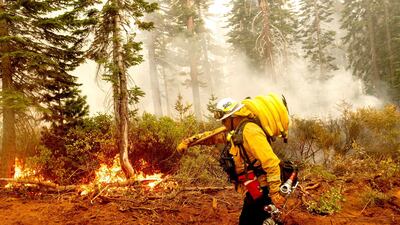The scene is this: I am sitting in the garden of a London club with an old friend, an international businessman who is a club member. Over lunch he offers a confession. It has been six months since he has thought about business meetings in person. He's done his work on Zoom. Now business is "getting back to normal," but he then says no one knows what "normal" is any more.
As an example he joked that after thinking about restarting his first face-to-face formal business meetings, he woke up one night wondering if he could still tie a tie. He laughed, but he was serious. Surely tying a tie is like riding a bicycle, I suggested. You don’t forget.
He said that he really could not sleep thinking about it so he got up, put on a shirt and was relieved to find he still remembered how to do it, then went back to sleep, happy.
Of course there are many more serious matters in the world than the triumph of a man remembering how to tie business neckwear, but as many countries are seeing another spike in Covid-19 cases, the underlying question is real: what is normal any more?
To get to that lunch I travelled by London Underground. It was far from normal – carriages half empty, almost everyone wearing a mask. Will we be like China where wearing masks on public transport has been normal for years? Probably. And how about the revelation in Bob Woodward's latest book, Rage, that US President Donald Trump recognised how deadly coronavirus would be but he told Woodward: "I wanted to always play it down. I still like playing it down, because I don't want to create a panic."
Outrage from some people against Mr Trump’s words is now normal. But it is also normal for those who sympathise with the president to shrug and say it is just Trump being Trump. In Britain, when scandals of various sorts have broken out in the government, the new “normal” is now for no one to resign.
Among many recent scandals, which in the past would have led to someone losing their government job, the new normal means we have had a housing minister who had cosy chats with a property developer who donated money to Conservative party funds; we have the prime minister’s chief adviser, Dominic Cummings, breaking strict coronavirus lockdown rules while suffering from Covid-19 and driving 250 miles away from London.

And we have had this week the revelation from the Northern Ireland Secretary that the British government is content to break international law. In what used to be “normal” times, any of these issues would have led to a minister or adviser resigning or being fired. But now? The new normal means, once more, most of us shrug and move on.
A former British prime minister, Harold MacMillan, was once asked by a young man what can blow a government’s plans off course. He supposedly responded with: “events, dear boy, events.” The events of 2020 have been like a blizzard blowing all of us off course, turning the idea of normality upside down.
Some experts suggest that despite work on a vaccine, it may unfortunately become normal for coronavirus to become just like flu — something which returns year after year, without ever completely disappearing. It may also become normal to accept new lower standards for politics and politicians in some countries.
But hope is also normal. Perhaps some of the terrible events that hit us recently will shake us out of our complacency and provoke major changes in behaviour. The wildfires which devastated vast areas of Australia a few months ago and which are now hitting the West coast of the US mean that climate change denial is very difficult to sustain.

In just the past few days we have seen more than half a million Americans in the US state of Oregon forced to evacuate their homes as a result of these wildfires. That is more than 10 per cent of Oregon’s population of 4.2 million.
Climate-related shocks have clearly become part of our new normal, from unusually heavy rains and flooding to the hottest years on record. Maybe, just maybe, the world may decide that we cannot live any more with such obvious evidence of human activity changing the world’s climate.
And if half a million people in Oregon, a beautiful part of the richest country in the world, can become homeless as a result of once “freak” events, which have now become normal, maybe those of us in rich countries might also reconsider what it means to be forced to flee our own homes.
Is becoming homeless in Oregon any different from fleeing Syria or Afghanistan? Is the misery any different for those fleeing poverty in Latin America and trying to enter the US? Refugees and migrants are no different from the rest of us. There are 70 million displaced people in the world, including those from Oregon. Human compassion is normal. Let’s show it.
Gavin Esler is a UK columnist for The National



